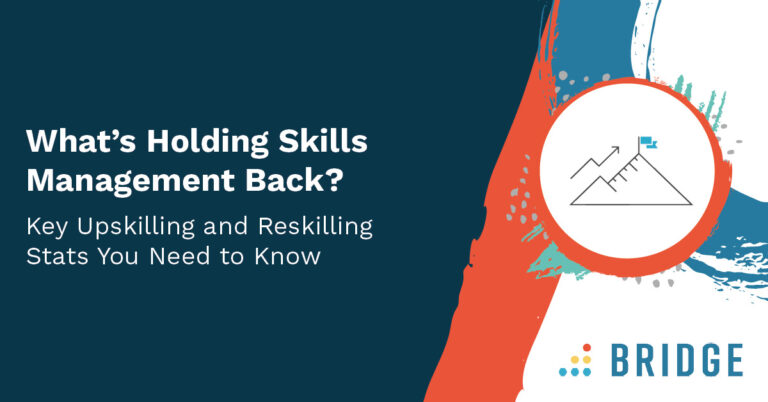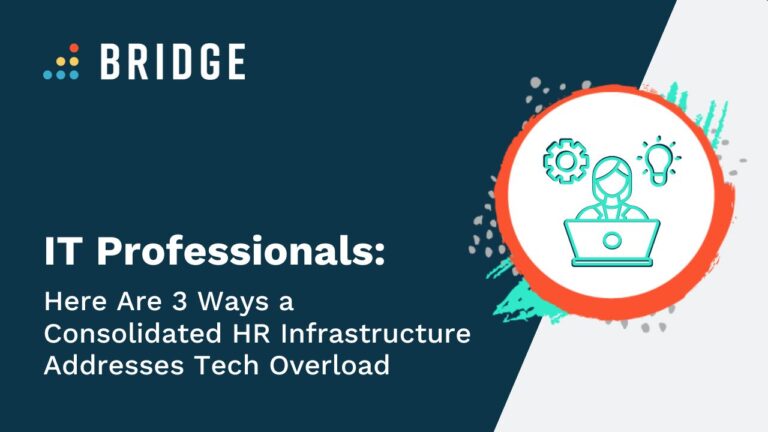Happy National Career Development Month! Throughout the month of November, companies and employees around the nation are celebrating career-related activities.
Research shows that one-third of employees leave their job because they crave more career development opportunities, and their just not seeing their organization’s performance management system working for them. We asked a few of our Bridge Employee Development Platform customers to share how they think companies can best support career development for their employees – not just this month, but all year long.
How can companies best support career development for employees?
“Many companies focus on customer experience and customer journey and completely miss that employees have an experience and are also on a journey with their organization. We need to be more vigilant than ever about internally marketing opportunities and making sure it’s apparent to employees how they can advance, all while creating new and interesting opportunities to develop in their current roles. Development is a new commodity and employees expect growth, even if it’s not always immediately job related. Celebrating wins, open discussion about challenges and career goals, rethinking how we communicate and interact, creating an internal community, and viewing the employee experience as a journey has shaped how we’re supporting career development.”
– Heidi Bynum, Manager-Sales Training, Bluegrass Cellular
“I think one of the best things companies can do to support career development is to help their employees understand that it is a shared responsibility. It’s the employee’s responsibility to jump on opportunities and have a learning mindset, and the organization’s responsibility to ensure that they foster a culture that celebrates development and encourages employees to engage. How companies do this will vary, but it might include training managers to recognize people who are learning new things, celebrating failures as well as successes, and ensuring that employees are involved in co-creating their objectives.”
– Phil Burgess, Chief People and Operations Officer, C Space
“Career navigation isn’t about a single path to a single destination. It’s about exploring, learning, and evolving as you go. We support employees with tools, processes, and opportunities to develop. This includes transparency into open roles, opportunities for bubble assignments, and learning experiences that range from virtual, self-paced modules to multi-year leadership development programs. We also encourage managers to give their employees exposure to other areas and leaders so they can broaden their circle of sponsorship and build their network throughout the company.”
– Amy Speranza, Global Learning Leader, GE Career Accelerator Programs, GE
“The first step in supporting career development for employees is to set expectations about what you can and cannot do. Regular recognition of exceptional work is easy to execute and a strong motivator. When employees can mirror the behaviors of a recognized high performer, they frequently become high performers themselves. Constructive feedback given in a timely manner that focuses on areas of opportunities is also essential to career development. The cost is time to actively listen and deliver the feedback, but the ROI is tremendous when communicated effectively.”
– Carrie Berg, Director of Learning and Development, Livongo
“Career development, like leadership training and professional certification, is great for employee engagement and retention. But it can be difficult to reserve budget for this when your executive team has competing funding priorities. If you’re working to make the case for career development opportunities, tying those opportunities directly to core business strategies will increase the possibility of getting approval. Once you’re clear on the strategies that your company identified to move the company forward, your work will be to connect those strategies overtly with the skills that your proposed career development opportunities feature. Whatever your request process is, make it easy for the decision-makers in your company to see how supporting these career development activities will further their strategies and help them reach their goals.”
– Kate De Jong, Organizational Development Specialist, Red Door Interactive
“This is a question I am asked frequently, and is the focus of many a conference presentation and Q&A panel session. My answer is always the same and a simple one: ask them. Too much time is spent on elaborate plans and strategies devised in silos – away from the employees, without their input – then presented to them stating it was created with their interests at heart and that the employees should be automatically vested in it. Asking employees what support they need puts HR and L&D departments in a better position to deploy a career development strategy that works for their company.”
– Dr. Hannah Gore, Talent Development Manager, Solera Holdings Inc.



